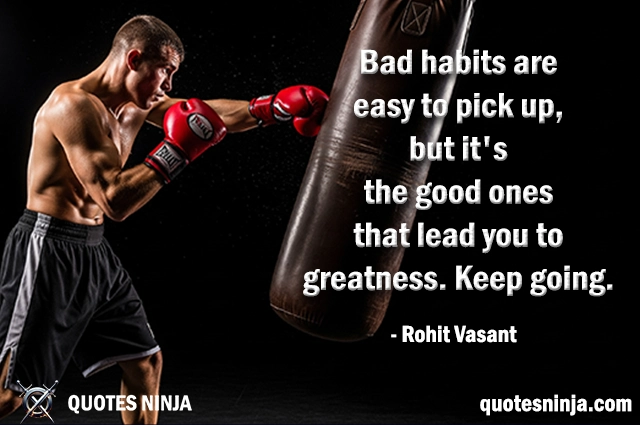
Deeper Meaning of Wisdom Quote
Wisdom Quote: “Bad habits are easy to pick up, but it’s the good ones that lead you to greatness. Keep going.”
The quote, is widely attributed to Rohit Vasant is an Indian Computer Engineer and co-founder of Quotes Ninja.
Here’s a breakdown of the quote’s meaning:
🔹 1. Bad Habits are Easy to Pick Up
- Negative habits (like procrastination, unhealthy eating, avoiding hard work, giving up easily) don’t take much effort.
- They feel comfortable at first because they provide short-term pleasure or escape.
- But over time, they create barriers to growth and success.
🔹 2. Good Habits Lead to Greatness
- Positive habits (discipline, persistence, hard work, self-control, learning daily) are harder to develop because they require effort and consistency.
- Over time, they build character, resilience, and skill, which are the real ingredients for success.
- Greatness is never a result of a single action, but the compounding effect of small, good habits practiced daily.
🔹 3. Keep Going
- The key message here is consistency.
- Even when progress feels slow, sticking with good habits eventually pays off.
- Greatness isn’t achieved overnight; it’s the result of persistence despite challenges.
✨ In short:
Bad habits are the easy path that lead nowhere. Good habits are the harder path, but they take you toward long-term success and greatness. The quote encourages persistence and reminds us not to quit even when the journey feels tough.
Here’s a story inspired by Wisdom Quote “Bad habits are easy to pick up, but it’s the good ones that lead you to greatness. Keep going.”
Wisdom Story: “The Path to Greatness“

The Lonely Beginning:
When twelve-year-old Dre Parker moved from Detroit to Beijing with his mother, he felt lost and disconnected. The cultural differences, the language barrier, and the overwhelming sense of being an outsider pushed him toward loneliness. At first, Dre slipped into the easiest path: avoiding challenges, neglecting discipline, and reacting impulsively. Indeed, bad habits—like giving up quickly or hiding from adversity—crept in because they were comfortable.
However, his life changed dramatically when he crossed paths with Cheng, a local bully who humiliated him through martial arts. The beating left Dre not only bruised but also defeated in spirit. He could have surrendered to bitterness, yet the humiliation planted a seed. Deep inside, he longed for strength, respect, and courage.
As fate unfolded, Dre met Mr. Han, the quiet maintenance man of his apartment building. At first glance, Mr. Han appeared ordinary, but beneath his humble exterior lay mastery of kung fu and, more importantly, wisdom about life itself. When Dre asked for help, Mr. Han did not immediately teach him flashy moves or easy tricks. Instead, he began with what seemed like meaningless tasks: taking off a jacket, hanging it up, picking it up again, and repeating the process countless times.

The Jacket Training:
At first, Dre grew frustrated. He wanted quick results, not endless repetition. Bad habits, after all, lure us with promises of shortcuts. Yet, through transition after transition—from frustration to patience, from confusion to trust—Dre began to notice something profound. These small, consistent actions were shaping his body, his discipline, and his focus.

The Transformation:
Discipline, unlike laziness, is not easy to adopt. Dre faced mornings of exhaustion, nights of soreness, and moments of doubt. Nevertheless, Mr. Han’s guidance emphasized that greatness does not arrive overnight. Rather, it emerges from the persistence of good habits.
Step by step, Dre replaced his bad habits of avoidance with good habits of dedication. Instead of shrinking from challenges, he confronted them. Instead of reacting with anger, he practiced self-control. Each day, his body grew stronger, but more importantly, his character deepened.
Eventually, Dre entered the kung fu tournament—a stage far beyond his comfort zone. Transitioning from training to competition demanded not only skill but also courage. He faced skilled opponents, each one seemingly more powerful than the last. The easy path would have been surrender, yet Dre had already chosen a different road.
During the matches, every habit he had built—his endurance, his balance, his focus—surfaced naturally. Good habits, repeated faithfully, became second nature under pressure. Even when Cheng struck him with ruthless force, Dre refused to crumble. He remembered Mr. Han’s words and his own growing belief: persistence leads to greatness.

The Tournament Challenge:
In the final match, Dre’s leg was injured badly. The crowd doubted his ability to continue, and even Cheng seemed certain of victory. Here, the contrast between bad habits and good ones became crystal clear. A bad habit would have told Dre to quit, to escape pain, and to accept defeat. A good habit urged him to keep going, to push beyond temporary suffering, and to embrace the possibility of triumph.

The Cobra Stance Victory:
Choosing courage, Dre returned to the mat. Every ounce of training, every drop of sweat, and every disciplined repetition prepared him for this defining moment. With determination blazing in his eyes, he executed the famous “cobra stance” and delivered a decisive kick that stunned Cheng and electrified the audience.
Dre’s victory was not merely about defeating his opponent. Rather, it was about conquering himself.

Respect Earned:
He had broken the cycle of bad habits—fear, avoidance, and laziness—and replaced them with persistence, discipline, and courage. Through transitions of doubt, struggle, and perseverance, he discovered that greatness is not a destination but a habit in itself.
Even more powerful was the transformation in Cheng and his friends, who bowed to Dre in respect. The victory extended beyond personal glory; it illuminated how good habits inspire not just oneself but also others.
The story of The Karate Kid perfectly illustrates the wisdom of the quote: “Bad habits are easy to pick up, but it’s the good ones that lead you to greatness. Keep going.” Bad habits offer immediate comfort but rob us of growth. Good habits demand effort, consistency, and patience, yet they build resilience and open doors to greatness.
Dre’s journey reminds us that every small action matters. Hanging up a jacket, repeating a stance, showing up day after day—these seemingly minor choices shape who we become. And when the moment of truth arrives, those habits rise with us, guiding our hands, steadying our hearts, and carrying us to triumph.
Moral of the Story:
Ultimately, The Karate Kid is not just about kung fu. It is about life itself. Every person faces the temptation of bad habits and the challenge of building good ones. While the first road is easier, it leads to emptiness. The second road is harder, yet it forges greatness.
So, whether you are facing school, work, or personal challenges, remember Dre Parker’s story. Like him, you may stumble, you may struggle, but if you choose discipline over ease and perseverance over surrender, you will discover your own path to greatness.
Because, after all, bad habits are easy to pick up, but it’s the good ones that lead you to greatness. Keep going.
To explore more on stories and dive into related ideas, be sure to check out the other posts where we cover all sort of stories related to quotes. Stay tuned for more…..
To explore more on quote topics, be sure to check out the other topics where we cover all categories of quotes. Stay tuned for more…..

